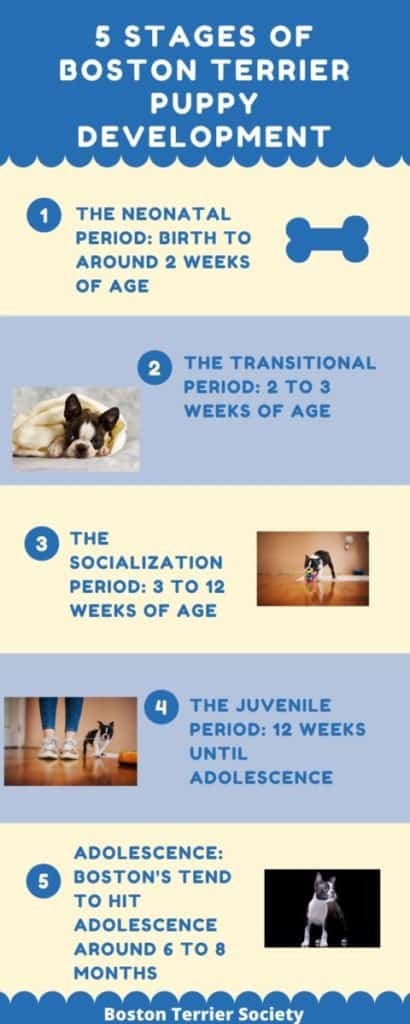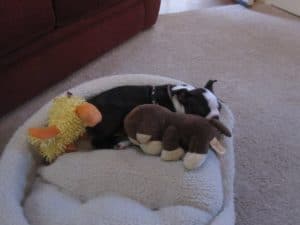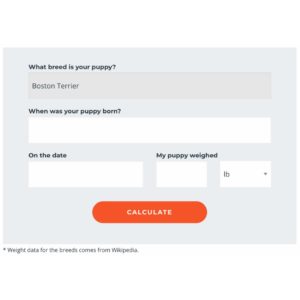One day your Boston Terrier is cute, cuddly, and small enough to fit into your hand.
Then you blink, and they’re eating you out of house and home, running around brazenly as they get into mischief and are all grown up.
Where does the time go, and how can we, as Boston parents, prepare for the growth of our Boston Terrier puppies?

Boston Terrier puppies will go through five stages of puppyhood from birth to a little over a year old.
During these growth stages, they will experience significant changes in their size, mental capabilities, and exercise needs, in addition to sexually maturing.
Let’s break down what to expect as you’re lovingly helping your Boston Terrier blossom into a mature adult… or rather an overexcited, dorky, and lovable one!
Boston Terrier Puppy Development, Weight, & Growth Over The First Year.
Watching these beautiful little Boston Terriers grow up is one of the best things in the world.
Here are the topics covered in this article feel free to jump to what you need.
How Big Do Boston Terriers Get?
The average adult Boston Terrier weighs between 12 and 25 pounds.
There are three main weight categories for Boston Terriers:
- 15 pounds or less (the equivalent of 7 kilograms) – This is a tiny Boston Terrier!
- 15 to 20 pounds (ranging from 7 to 9 kilograms)
- 20 to 25 pounds (9 to 11 kilograms)
Boston Terriers typically fall between 15 and 17 inches tall and are compact, but sturdy dogs. Based on their weight.
This adorable dog breed is considered a small dog.
Average Weight Of A Boston Terrier By Age
The chart below is for informational purposes only. You should consult with your veterinarian about the proper size your Boston Terrier should be.
| Age | Approx. weight in pounds | Approx. weight in kilograms |
| Birth | 0.48 lbs | 0.22 kg |
| 1 Month | 2.53 lbs | 1.15 kg |
| 2 Month | 4.40 lbs | 2.00 kg |
| 3 Month | 6.61 lbs | 3.00 kg |
| 4 Month | 8.81 lbs | 4.00 kg |
| 5 Month | 12.12 lbs | 5.50 kg |
| 6 Month | 14.33 lbs | 6.50 kg |
| 7 Month | 16.09 lbs | 7.30 kg |
| 8 Month | 19.84 lbs | 9.00 kg |
| 9 Month | 20.94 lbs | 9.50 kg |
| 10 Month | 21.29 | 9.75 |
| 11 Month | 22.05 lbs | 10.00 |
| 12 Month | 23.14 lbs | 10.50 |
*This is an approximation of weight based on statistics gathered from many Boston Terrier owners (source).
Once again, this chart is to be used as a guide. Depending on your Boston Terriers’ parents, genetics, and diet, the growth trajectory may be quicker. Or it could take longer for you Boston to become fully grown.
Also, a female Boston will be done developing sooner than a male. Plus, if you have a male Boston Terrier, they are going to be slightly larger than a female, and the time it takes your male Boston to reach maturity may take up to 14 months.
Want To Find Out How Big Your Boston Terrier Will Become?
Here is a calculator that will help you determine how large your Boston Terrier will become.
This calculator is an estimation and should not be used for medical advice.
Before getting started, all you need to know is your Boston’s birthdate and how much they currently weigh.
Is There A Difference In Height & Weight Between Male And Female Boston Terriers?
According to PetMD, female dogs are smaller in size and tend to reach maturity than males of the same breed.
You might be surprised to learn that the difference between male and female Boston Terriers in size and height is very minute. And this could be because of their small stature.
There is little difference in weight between both genders, and male Boston Terriers are barely taller by about an inch on average.
| Height At Withers | Weight | |
| Male | 17 in (43.18 cm) | 15 – 25 lbs (6.8 – 11.3 kg) |
| Female | 16 in (40.64 cm) | 10 – 20 lbs (4.5 – 9.1 kg) |
*Source: Hill’s Pet
This stands out because many dog breeds have a considerable difference in the build of a male versus female dog. Still, Boston Terriers are very close in size regardless of gender.
When we purchased Nickel, our breeder discussed similar weight brackets, and it’s something to consider when you’re thinking about owning a Boston Terrier.
Any Boston Terrier over 25 pounds is very unusual in size and potentially overweight.
Check with your veterinarian about what your Boston Terrier’s ideal weight is once they’ve reached adulthood.
How Does A Boston Terriers Stages Of Growth Differ From Larger Breeds?

Small dog breeds, like Boston Terriers, have a significantly shorter growth period than larger dog breeds overall like a Bullmastiff.
When Will A Boston Terrier Stop Growing?
The typical Boston Terrier is finished growing around 10 to 14 months old, whereas large dog breeds like the Bullmastiff take approximately two and a half years to finish growing.
That’s about double the time it takes our Boston Terriers to grow up!
This time difference is due primarily to large dog breeds needing more time for joint and bone growth to reach their full, taller height.
All dogs are considered adults once they’re a year old, but their height and size dictate what stage of growth they are in.
My Boston Terrier, Nickel, was so small that she could fit into the size of a single kitchen tile.
Now, she is easily over two or three tiles in length.
It’s incredible to see the rapid growth our Boston Terriers undergo!

The 5 Stages Of Puppy Development In Boston Terriers

There are five stages to all puppy development, no matter the breed.
During each stage, your Boston Terrier is going to experience something new on their journey to becoming an adult.
We will dive into each stage individually.
Here are the approximate stages of puppyhood
1) The Neonatal Period: Birth to around 2 weeks of age
2) The Transitional Period: 2 to 3 weeks of age
3) The Socialization Period: 3 to 12 weeks of age
4)The Juvenile Period: 12 weeks until adolescence
5) Adolescence: Boston Terriers tend to hit adolescence around 6 to 8 months
The Neonatal Period (Birth To Two Weeks Old)
The Neonatal period or stage is one of the fastest growth periods.
And this stage is one that many of us did not witness with our own dog since puppies are not usually taken from their mother this early on.
During the first two weeks of our Boston Terriers’ life, they are almost always sleeping or eating (about the same as today, joking).
They aren’t able to move far, stand, and can barely crawl.
Mother Is Crucial During This Time

Their mother is vital to their well being at this time as they depend on her for food and warmth. If a mother moves the puppy, the baby Boston will thrash it’s head around, trying to locate her.
Their mother will also ensure that her puppies urinate and defecate. And she is responsible for keeping the area clean since they are unable to crawl far enough away to pee in a separate location.
Boston Terrier Eyes And Ears At Birth
Boston Terriers puppies are born with closed ear canals as well as closed eyes.
A vital component of the neonatal period is the puppies opening their eyes for the first time, starting around ten days.
However, their eyes do not begin responding to light until the transitional period.
The Transitional Period (Two To Three Weeks Old)
Due to how early the transitional period occurs, this is another puppy stage, most of us will miss seeing.
The key developments during the transitional period is the puppy getting used to its newly opened eyes, as well as learning to naturally move away from where they lay to urinate or defecate.
Puppies usually begin playing with each other and exhibiting other social behaviors like growling and tail wagging at this time.
Their ears also open at this time, and they begin responding to auditory stimuli.
A puppy will usually begin eating food and drinking water out of a dish, but will likely still rely heavily on their mother for food and nourishment.
Key Takeaways: Getting used to their eyes, social behaviors beginning, and more movement.

The Socialization Period (Three To Twelve Weeks Old)
This pup development stage is what many of us encounter when we buy a young dog!
Since most states do not allow puppies to be bought before eight weeks of age, many of us will see the latter half of the socialization period of a young puppy.
The socialization period is crucial because it determines how your Boston Terrier will react to stimuli and social situations around them for the rest of their life.
At the beginning of the socialization period, puppies will try barking for the first time and typically begin to exhibit apprehension with loud noises.
Why Is Dog Socialization So Important?
Socializing your Boston Terrier puppy correctly can have a lasting impact on how they respond to humans for the rest of their life.
It’s recommended that you introduce your Boston Terrier puppy to as many things as possible during this time. Such as other humans, loud noises, different smells, rain or snow if possible, and more!
If they are okayed by their veterinarian, socializing them with other dogs will help them gain confidence amongst their peers too.
If you are at the stage to begin socializing your Boston Terrier here is a helpful guide we created to start you on your journey of socialization: Ultimate Guide To Socializing A Boston Terrier
My Personal Story Of Socializing Nickel
During the socialization period, I remember we purposely burnt toast to expose Nickel to an unpleasant smell.
This was among dragging her outside when it was raining and having her meet plenty of new people.
She is still unhappy when it rains, but everything else we socialized her on, she copes with well.
Take the time to go through as many environments and situations as you can safely.
Get Started With Familiarizing Your Boston Terrier With These Stimuli
Try introducing your Boston Terrier puppy to the following (even if they are past the socialization stage):
- Other animals and pets
- Take them on walks, in your car, and other new environments.
- Make some noise! Use all of your appliances, run your noisy dishwasher, blast music, etc.
- Other people – group settings can be great for this.
- Being alone – your Boston Terrier must know being alone is okay!
Exposing your Boston puppy to as much as possible will set them up for future success and realizing that these things are fine and not to be feared.
Key Takeaways: Socialize your Boston Terrier as much as possible.
The Juvenile Period (Three To Six Months)
The juvenile period is much like our own teenage years. We are close to reaching our final size, our adult teeth are coming in, and sexual interest peaks.
Boston Terriers will be in the juvenile period, their “teen years,” until they hit about half a year old.
During this stage, they will replace their first set of teeth, grown during the socialization period, and develop their final set of adult teeth.
Once they’ve reached six months of age, they will have close to the same motor skills as their adult selves will have.
My Boston Terrier, Nickel, is very agile and, from a young age, showed great athleticism. Her coordination, even as a young puppy, was spot on and continues to show as an adult today.
What Do You Need To Do During The Juvenile Stage?

Your Boston Terrier puppy will need continued socializing during this stage.
Continue to introduce them to new smells, sounds, and people so that they can be their most confident selves.
Bostons are a particularly energetic breed, so making anything a game will be a sure win with them!
Be patient with them as they are still a puppy and will have a short attention span.
Sexual Interest And First Heat During The Juvenile Stage
Another critical factor of the juvenile period is your Boston hitting sexual maturity. During this period, they are likely to show sexual interest in other dogs.
Around six to seven months old, a female Boston Terrier will go into heat for the first time.
Males will begin showing interest in females, but it’s not uncommon for this to happen earlier on.
You must discuss spaying and neutering options with your veterinarian around this time. In order to not compromise your dog’s long term health or any unwanted surprises!
Key Takeaways: Talk to your veterinarian about neutering options before sexual maturity peaks, the final set of adult teeth coming in, and nearing adult size and ability.
Adolescence (Approximately Six To Eighteen Months Of Age)
Welcome to young adulthood with your Boston!
Watch for these signs in your Boston to identify when they’ve hit adolescence:
- Tons of energy and hyperness
- Choosing to disobey
- Aggressiveness
- Lowered attention span
- Struggling to socialize or showing a lack of interest in socializing
- For males, leg cocking and mounting behavior (i.e., “humping”). This will be worse in dogs that are not spayed.
It’s hard to see all the hard work you put in training go downhill during this rebellious stage, but don’t fret!
This is the stage before full adulthood, and your Boston Terrier is breaking out on their own.
Does A Male Boston Terrier Become More Aggressive During The Adolescent Stage?
After reaching sexual maturity in the juvenile stage, your Boston Terrier will have the urge to spread their scent and show the competition that they are top dog.
Males are especially prone to this.
Don’t be overly concerned if they seem to be suddenly “picking fights,” as these rarely end in any harm to either dog involved.
These fights are more to determine who is the top dog, and they typically last only a few seconds, ending once the stronger dog is confirmed.
Your Boston Terrier may playfully bite you or another dog, but it should be without causing any injury.
If they are becoming too aggressive and hurting you or others, consult with your veterinarian immediately.
What Should You Do During The Adolescent Stage?
Continue training your Boston Terrier and consider making the training even more aggressive and bringing back the rewards that aided you in initially teaching them.
They will grow out of this stage and blossom into “calmer” adults.
Key Takeaways: Disobedience and aggression are likely to surmount, more aggressive fighting and the desire to be dominant, marking behaviors

Adulthood
After the adolescent period, which ends around 18 months of age, your Boston Terrier is in adulthood.
The time between birth and adulthood is short-lived, so be sure to enjoy every minute of raising your Boston puppy.
When Will My Boston Terrier Stop Growing?
Boston Terriers finish the last stage of puppyhood, adolescence, around 12 to 14 months of age.
Depending on how large your particular Boston Terrier is going to be, they will stop growing anywhere from 12 to 14 months of age.
If you bought your Boston Terrier from a breeder. Especially if they’re a purebred AKC-registered puppy, then the breeder should be able to let you know their approximate size.
The breeder would estimate your Boston Terrier’s size based on their family tree and how other members of the family filled out.
One benefit to purebred dogs is the consistency with their size and temperament, which makes this a reliable way to find out more about your Boston Terrier’s expected size.
My Personal Story With Nickel And Size

Nickel is a purebred Boston Terrier who came from the parents Bonnie Boots Boston and Irish McBentley.
Both of her parents are AKC registered, but we never took the time to register Nickel because it wasn’t super important to us.
Based on her purebred history and her parent’s names, you could say she’s a full-blooded Irish American dog!
Having Nickel come from a breeder duo was terrific for us because one breeder was a veterinarian and the other a dentist. They were also both AKC breeders.
Having her breeders be medical doctors reassured us that she was being raised with care.
They also provided us with a size prediction based on her parents and siblings. She ended up right in the middle of their size prediction!
If your Boston Terrier is a mix or comes from an unknown background, it can be harder to estimate their final size.
How To Tell If Your Boston Terrier Is Still Growing?
According to Greenfield Puppies, your Boston Terrier is likely still growing if you run your hands down their rib cage, and you can feel the knobby plates from their ribs.
If you can feel these, they are likely still developing their ribs and filling out.
Does Paw Size Indicate My Boston’s Full Size?
Per Vetted Pet Care, the size of a dog’s paws indicating their final adult size is a myth. This is especially true when looking at puppies before 10 weeks old.
It’s estimated that your Boston Terrier’s paw size around three months old is proportionate to their adult size.
But this makes it difficult to gather an idea about their full size if you’re planning on owning them before three months old.
Do Boston Terriers Reach Half Their Adult Size By A Certain Age?
It is estimated that puppies reach half their size around 14 to 16 weeks of age. This isn’t a perfect science, but it could give you an idea of their final size.
You can also look at the amount of loose skin your puppy has.
Unlike breeds like English Bulldogs, Boston Terriers don’t have an excessive amount of loose skin when fully matured.
Your Boston Terrier will eventually fill out their loose skin, so if there is a large amount of loose skin, you’re probably in for more growth spurts soon!
How Much Exercise Does A Boston Terrier Puppy Need?

A 10 to 15-minute walk with your puppy of three months of age plus is fine. However, the real answer to how much exercise for a Boston Terrier puppy is, it depends.
You will want to ease into any workouts. Be sure you are watching your Boston puppy for any exhaustion and make sure they are drinking plenty of water.
Puppies are simultaneously the most energetic and sleepiest creatures I’ve ever met. Even hyper Boston Terriers will sleep around 18 to 20 hours a day as a young pup!
Despite reaching adulthood, Nickel still seems to sleep that much. She’s got it made!
You may be thinking that puppies need as much exercise as possible. However, puppies can be overworked easily.
Lots Of Energy Does Not Equal High Endurance
Puppies are very energetic but in a delicate stage of their life, and we must watch out for them.
Since Boston Terriers are not a working dog breed, they need a bit less exercise overall, but you’ll still find them very playful.
Make time to play with your Boston Terrier daily and take them on walks if your veterinarian has approved this.
Too long of walks, running, or other high-intensity exercises could hurt your Boston Terrier’s bones.
Bones don’t fully harden in dogs until 18 months of age, so don’t allow your Boston Terrier to jump off high surfaces or overwork themselves.
Take this time to work on training them to sit and follow commands. This is both stimulating and rewarding for them and you – without being too aggressive.
Do You Have Other Dogs?

If you have other dogs around your growing Boston Terrier, watch their playtime.
Another puppy may be a great companion, and they will both naturally stop playing to take time to sleep and rest. Thus protecting them from overstressing their delicate bones.
An adult dog could be problematic due to their higher endurance and strength.
Your adult dog may be having fun with your Boston Terrier puppy. Still, without trying, they could overtire them or be too forceful.
Have mandatory downtime for an adult dog and puppy to prevent either from wearing the other out.
Does My Boston Terrier Need Different Food As They Grow?
Puppies have particular dietary recommendations to help them develop a healthy and robust body during intense periods of growth.
Optimal nutrition for your puppy should allow them to grow at a healthy speed, reduce their chances of obesity, fuel their immune system, and avoid putting them at risk of other medical conditions in the future.
When shopping for your Boston Terrier’s puppy’s food, look for dog food with labels like “all life stages,” which is dog food approved for both growing puppies and adult dogs.
“All Life Stages” food will also make the transition easier when your Boston Terrier reaches adulthood.
With other puppy food formulas, you may have to transition them to an adult formula, which could be difficult if they are particular or fussy about their food.
What Other Boston Terrier Owners Feed Their Boston Puppies
A poll was conducted in the Boston Terrier Society’s Facebook Group to determine what other Boston owners are feeding their dogs.
The number one answer for these Boston Terrier owners was to choose any type of Purina puppy dog food brand.
Here is an Amazon list of dog foods from Purina.
Signs Of A Good Dog Food Formula For Your Boston Terrier Puppy
- Healthy, normal stools
- Appropriate energy levels (energetic, but not crazy-eyed!)
- Their coat and skin are healthy and not flaky.
- Their overall health is strong.
- They are not gaining too much weight.
Your veterinarian can also provide you with specific recommendations based on your Boston Terrier puppy.
Ask them at your puppy’s next check-up to see what they may recommend adding or subtracting from your Boston Terrier’s diet.
When Will My Boston Terrier Calm Down?
Boston Terriers are known for many great things, but being “chill” dogs is not one of them. Or at least this is something I’ve never personally heard someone describe their Boston Terrier as.
Need help training your Boston Terrier not to pull, jump up, or chew? Learn how to stop puppy biting, jumping, and more with this affordable all-inclusive puppy training school from Dr. Dunbar’s Academy. Click here to correct all the normal behavior issues in your Boston puppy before they start – Puppy Training Academy.
In my experience with three Boston Terriers, they have all been quite hyper even well into adulthood.
As a breed, Boston Terriers are known for their high energy and strong, playful nature.
Your Boston Terrier puppy will almost certainly be very hyper and energetic.
As an adult, they may mellow out some.
My Boston Terrier, Nickel, is currently six years old, and she is still highly energetic, playful, and excitable.
We have noticed that at night she calms down more naturally and will lay down on us.
As a puppy, she was so wound up that she would do constant zoomies around the living room until we picked her up and let her run in the air.
Nickel was so tiny, we could let her run in the air easily, and it helped her to mellow out and sleep.
Boston Terriers seem to stay puppies in temperament longer than most!

When Should My Boston Terrier Be Spayed Or Neutered?
Spaying and neutering are very important procedures to protect your Boston Terrier’s overall health, wellbeing, and to prevent surprises!
Boston Terriers should be spayed or neutered around six months of age to prevent them from becoming overly aggressive, developing marking behaviors, or falling pregnant when unwanted.
This procedure should not be performed too early as it can lead to incontinence, especially in spayed females.
Spaying surgically removes a female dog’s uterus and ovaries, which will prevent her from having heat cycles and becoming pregnant.
Neutering removes the testicles of a male dog, which prevents them from impregnating a female dog.
Check out our full article here on the spaying and neutering process.
Medical Milestones For Your Boston Terrier Throughout Puppyhood
Puppies go through a lot during their first year, and it’s recommended that they see a veterinarian monthly during the first four months for vaccines.
Vaccines can help prevent many diseases and ailments later on and improve their overall quality of life.
Here is a chart showing the shot schedule for a Boston Terrier puppy.
| Boston Terriers Age | Recommend Vaccination |
| 6 – 8 weeks | Distemper, measles, parainfluenza |
| 10 – 12 weeks | DHPP (vaccines for distemper, adenovirus, hepatitis,parainfluenza, and parvovirus) |
| 12 – 24 weeks | Rabies |
| 14 – 16 weeks | DHPP |
| 12 – 16 months | Rabies, DHPP |
| Every 1 – 2 years | DHPP |
| Every 1 – 3 years | Rabies |
*(Source)
Your veterinarian will go over both strongly recommended vaccinations, like shots for rabies, and other more optional vaccinations, like the bordetella vaccine.
Talk with your veterinarian about what shots will give your puppy the most payoff.
Nickel Had An Optional Surgery Done
Boston Terriers have brachycephalic syndrome inherently, and this makes breathing, snoring, snorting, and respiratory issues more common.
It was recommended that Nickel’s stenotic nares be opened up, which widened her nostrils so that air would flow through more efficiently.
Nickel is the first of our Boston Terriers to ever have this done.
We would recommend this procedure to others and consider it for our future Boston Terriers. All because she is active and breathes easier than other Boston Terriers we have had.
It’s something I personally recommend asking your veterinarian about while your Boston Terrier is still a puppy!
What To Watch Out For During Puppyhood
As is true of any time of their life, dogs are at risk for medical issues. Puppies can have an array of medical issues that are often specific to their rapid growth and lack of a robust immune system.
Here are three things to watch out for…
Obesity
Obesity in puppies can be severe and has long term effects on their health. Most commonly, obese puppies will develop hip dysplasia and other bone-related issues.
This is thought to be because the puppies’ bones are not fully hardened until around 18 months.
If additional stress is put on their bones and joints, they may not develop properly, leaving them with bone and joint issues.
Heartworm Disease
We started giving Nickel a heartworm preventative pill each month as a puppy to prevent heart failure and lung disease that may happen when a worm enters your puppy’s heart.
Puppies may not show signs of having heartworm until around six months, so it’s important to be preventative with this!
Kennel Cough
Kennel cough is a highly contagious respiratory disease.
Signs of Kennel Cough:
- Sneezing
- Loss of appetite
- Makes unusual sounds like honking
- Low fever
- Or basically has signs you would think are related to a common cold found in humans.
If your Boston Terrier shows any of the above signs for kennel cough, you should immediately call your veterinarian and have them seen.
Wrap up
Puppyhood is the quintessential time where your Boston Terrier is growing into their body, personality, and spunky nature.
Treasure these moments while they are still small enough to fit in one hand because it won’t last forever!
When you’re struggling to be patient with them after they’ve eaten another shoe, remember that adulthood will come around all too soon.
Nickel is such a joy to have around, and we frequently remember her puppy stages with fondness and disbelief at how tiny she was.
It’s hard to believe now!
Related Questions Regarding Boston Terriers And Growth
What is the average lifespan of a Boston Terrier?
A Boston Terrier will live on average 11 to 13 years. Several factors go into how long a Boston will live like hereditary issues, size, diet, and more.
Learn more about a Boston Terriers’ lifespan and how to increase it here; How Old Is Your Boston Terrier In Human Years And Vitality Tips.
Is A Boston Terrier A Small Or Medium Dog Breed?
According to the American Kennel Club, a Boston Terrier is a small size dog breed. The average purebred Boston Terrier should not be more than 25 lbs.
At What Age Do Female Boston Terriers Stop Growing?
Female and Male Boston Terriers will stop growing around the same ages of 12 to 14 months of age.
However, because of the smaller average size of female Boston Terriers, they may stop growing at a younger age compared to a larger sized male.
Are You A New Boston Terrier Owner?
If you have your first Boston Terrier or the little bundle of joy next to you is your first dog ever, chances are you have a lot of health-related questions.
Boston Terrier Society has teamed up with Pawp.com. Here you have access to a veterinarian 24/7 to ask unlimited questions about your Boston’s health.
You Can Ask Questions Like These To A Licensed Vet:
- How much should I feed my puppy?
- What kind of food should I feed my puppy?
- Is it normal for my puppy to throw up?
- When should I potty train my Boston Terrier puppy?
- Should I be giving my dog supplements?
Check out this amazing service here, Pawp.com.
Other Articles You May Like To Read
- Fun Quiz: Is This A Boston Terrier Of Frenchie
- Fun Quiz: How Well Do You Know The Boston Terrier Breed
- Fun Quiz: Should I Get A Boston Terrier
- 15 Interesting Facts About Boston Terriers
- Boston Terrier Zoomies Everything You Need To Know
- 20 Winter Exercises You Can Do With Your Boston Terrier
References
- When Does My Puppy Finish Growing? How Long Do Puppies Grow?
- State Laws Regarding Age Of Puppy For Sale
- The Stages Of Puppy Growth
- A Dog’s Stages of Life
- Puppy Development and Key Milestones
- Do a Puppy’s Paws Really Show How Big She’ll Get?
- Ask an Expert – Can you over-exercise a puppy?
- One Sick Puppy: 7 Puppy Illnesses To Look For
- Do Female Dogs Age Differently Than Male Dogs?


